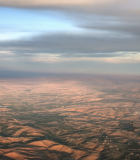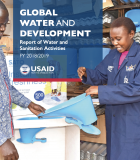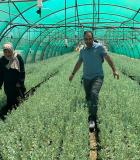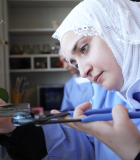Water Reuse & Environmental Conservation Project (WRECP)
USAID and the Government of Jordan (GoJ) worked together to protect and conserve scarce resources through WRECP. The project supported the preservation of the environment, training on pollution prevention and environmental management, rehabilitation for landfills and polluted “hot spots,” and the reuse of water and biosolids to support community livelihoods. Main goals included:
- Increasing the efficient use of water and energy by Jordanian industries through training and technical support.
- Supporting industrial efforts to improve environmental performance.
- Improving the Ministry of Environment’s (MoEnv) capacity to enforce environmental regulations.
- Strengthening the ability of laboratories to analyze industrial wastewater samples.
- Cleaning up polluted “hot spots,” improving industrial waste management practices, and strengthening industrial wastewater treatment.
- Helping communities generate income through water reuse projects.
- Increasing public awareness of the benefits of water reuse and promoting the sustainable reuse of biosolids.
Project beneficiaries included the industrial sector, farmers, targeted government ministries, and the general public. Primary partners include the Aqaba Special Economic Zone, King Abdullah II Center for Excellence, Jordan Investment Board, Jordan Chamber of Industry, Ministry of Agriculture, Ministry of Municipal Affairs, Ministry of Environment, Ministry of Industry and Trade, Ministry of Water and Irrigation, and the Royal Scientific Society.
Activity Description
The project developed technical assistance and training plans to enhance the enforcement capability of the MoEnv and to emphasize priorities identified during the assessment. Task 1 activities maximized coordination with other USAID projects and other donors to provide training and mentoring to MoEnv and Environmental Rangers staff. Task 1 also supported the technical abilities of the MoEnv on the abatement of industrial pollution through enhanced access to industrial wastewater laboratory analyses. It further promoted compliance assistance efforts for the regulated community through information sharing and data management, as well as through expanding and promoting the services of the information knowledge center (IKC). To better manage, utilize, and enhance the sustainability of the IKC, it was split into the Environment Compliance Database (ECD) within the MoEnv and Network components within the industrial community (i.e. the Jordan Chamber of Industry (JCI)).
The project surveyed 400 industries and will work closely with up to 40 selected industrial facilities to survey pollution sources, gauge interest in pollution prevention activities, and instill good environmental practices through environmental management systems/pollution prevention (EMS/P2) initiatives. Task 2 also included the preparation the conceptual designs, cost estimates, and technical specifications for three Industrial Wastewater Treatment Plants (IWTPs).
WREC worked with local team members, on-site workers, and the MoEnv to investigate disposal sites, identify potential improvements, and, at certain sites, implement improvements in a cost-effective and environmentally and socially responsible manner. Findings from site investigations were the basis for evaluating the feasibility of alternatives for remedial actions and site closures. Alternatives included replacing existing active facilities with new proposed facilities, or simple low-cost, high–return management changes, such as reducing the landfill working face.
WREC worked with a wide range of stakeholders, primarily the Ministry of Water and Irrigation (MWI) and Water Authority of Jordan (WAJ), to identify and plan new water reuse pilot projects that will enhance community livelihoods for generating income from the reclaimed water irrigation of agricultural crops. In addition to the technical assistance provided to establish new pilot projects, WREC provided technical assistance to the previously established reuse pilot in Wadi Mousa. Sustainability was of utmost importance for these pilot projects, so WREC worked closely with local communities, as well as stakeholder government institutions, to develop plans to support self-sustainable operation of the pilot projects. The plan for the Reuse Knowledge Center (RKC) has changed from a physical facility at Wadi Mousa to supporting a non-governmental organization (NGO), Jordan Desalination and Reuse Association (JoDRA), that had similar goals in terms of disseminating water reuse knowledge and expertise. The approach was for the concept of a Wastewater RKC to be developed independently of the originally planned facility at the Wadi Mousa pilot site; however, identification of physical sites as interface points for the dissemination of knowledge was ongoing, including the Sustainability Center at the King Abdullah II Park and other sites.
Expected Outcomes
- Strengthen regulations
- Improve pollution prevention and industrial waste management
- Rehabilitate disposal sites
- Train farmers and water users’ association on irrigation system repair, marketing, and best practices
Actual Outcomes
- Trained 2,665 people in environmental protection
- Reused 790,000 m3 of water annually
- Increased the efficient use of water and energy by Jordanian industrial facilities, through training and technical support
- Improved environmental performance in industrial factories, so they pollute less and save money in the process
- Improved Ministry of Environment (MoEnv) capacity to enforce environmental regulations
- Strengthened ability of laboratories to analyze industrial wastewater samples
- Cleaned up polluted hot spots, improved industrial waste management practices, and strengthened industrial wastewater treatment
- Helped communities generate income through water reuse projects
- Increased public awareness of the benefits of water reuse and promoted the sustainable reuse of biosolids





